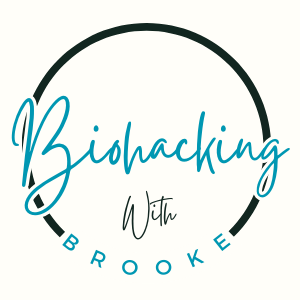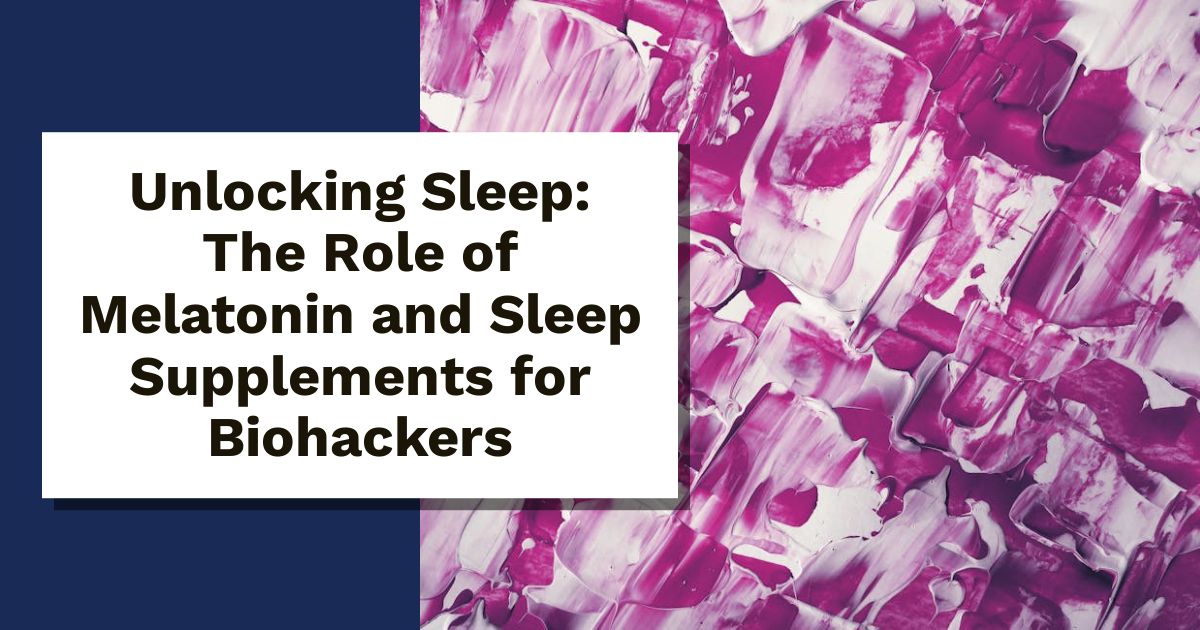Sleep is a game-changer for biohackers. It’s not just about clocking hours; it’s about quality. If you’ve ever tossed and turned while counting sheep, you know the struggle. Lack of rest can throw off your focus, mood, and overall performance.
That’s where melatonin and sleep supplements come in. These aren’t just buzzwords. They can be key players in transforming your nights. Melatonin helps regulate your sleep-wake cycle, making it easier to drift off.
In this post, you’ll learn how to harness the power of these natural aids. Get ready to unlock deeper, more restorative sleep and boost your biohacking efforts. Your best nights are just a few insights away!
What is Melatonin?
Melatonin is a naturally occurring hormone that plays a key role in regulating sleep. Produced primarily by the pineal gland in the brain, melatonin levels fluctuate throughout the day, usually rising in the evening and peaking at night. This rise signals the body that it’s time to wind down, promoting restful sleep. Biohackers often turn to melatonin for its potential benefits in enhancing sleep quality and adjusting sleep cycles, especially after travels or shifts in routine. Understanding how melatonin works and where it comes from can help you make informed decisions about your sleep health.
How Melatonin Works
Melatonin primarily helps regulate your sleep-wake cycles, which are influenced by external light. As night falls and darkness envelops the environment, melatonin production ramps up. This spike in melatonin triggers physical changes in the body, such as lowering body temperature and inducing a sense of sleepiness.
- Melatonin levels peak around midnight and gradually decrease as dawn approaches.
- Exposure to light represses melatonin production, helping to signal wakefulness.
- Disruption of this cycle—such as shift work or late-night screen time—can lead to poor sleep quality.
If you’re curious about the science behind melatonin and its effects, check out NCCIH’s overview or Mayo Clinic’s insights.
Sources of Melatonin
Your body produces melatonin, but certain foods can also provide natural sources of this sleep-enhancing hormone. Incorporating these foods into your diet may support your body’s melatonin levels and improve sleep.
- Cherries: Particularly tart varieties like Montmorency are known to contain melatonin.
- Grapes: Red grapes have been found to contain melatonin along with beneficial antioxidants.
- Tomatoes: A surprising source, tomatoes offer melatonin along with other health benefits.
- Walnuts: These nuts are not only a great source of healthy fats but also melatonin.
While food is a great way to boost melatonin levels, your body needs darkness to produce it efficiently. Make sure to optimize your sleep environment by reducing light exposure before bed.
For more details on dietary sources of melatonin, you can explore additional resources such as Cleveland Clinic’s information or Mount Sinai’s overview.
Benefits of Melatonin as a Supplement
Melatonin is more than just a sleep aid; it offers a range of benefits that can enhance your overall sleep experience. From improving the quality of your sleep to helping you recover from jet lag, melatonin stands out as a valuable supplement for biohackers. Let’s take a closer look at how this hormone can positively impact your sleep.
Improved Sleep Quality
Melatonin plays a crucial role in enhancing the quality of your sleep. It doesn’t just help you fall asleep; it encourages deeper, more restful slumber. By regulating the sleep-wake cycle, melatonin helps you transition into the deeper stages of sleep. Studies show that when melatonin levels are optimal, you may experience:
- Longer Duration of Deep Sleep: With adequate melatonin, your body can enter the restorative phases that are essential for physical and mental recovery.
- Less Nighttime Wakefulness: Higher melatonin levels can reduce disruptions during the night, allowing for uninterrupted rest.
- Enhanced Sleep Architecture: Melatonin helps balance the different sleep stages, promoting a harmonious cycle that is vital for rejuvenation. You can learn more about melatonin’s effect on sleep quality here.
The benefits are compelling—why struggle through sleepless nights when a little melatonin might be just what you need?
Jet Lag Relief
Traveling across time zones can throw our bodies out of sync. That’s where melatonin shines, acting as a natural remedy for jet lag. When you travel, your internal clock can fall out of step with the local time, causing wakefulness when you should be resting. Melatonin helps your body adjust more smoothly to new time zones by:
- Resetting Your Sleep-Wake Cycle: By taking melatonin before your targeted bedtime in the new time zone, you signal your body to adapt more quickly.
- Minimizing Symptoms of Jet Lag: Research shows that melatonin can significantly reduce the time it takes to adjust. It can help you feel more alert during the day and fall asleep at night more easily. For more on this, you can refer to this detailed article.
Have you ever felt groggy after a long flight? Melatonin could be your secret weapon against those post-travel blues.
Reduction in Sleep Onset Time
One of the most frustrating aspects of insomnia is the struggle to fall asleep. Melatonin has been shown to effectively shorten the time it takes to drift off. Here’s how it works:
- Promoting Sleepiness: Melatonin increases levels of sleepiness, making it easier for you to relax and doze off.
- Curtailing Restlessness: It also helps calm an overactive mind, reducing the tossing and turning before sleep.
- Facilitating a Quick Transition: Many studies indicate that melatonin can cut sleep onset time from around 30-40 minutes down to just 10-15 minutes. For further insights, you can check findings on Cleveland Clinic’s site.
Imagine curling up in bed and drifting off to dreamland in minutes. That could be a reality with the right amount of melatonin.
By understanding the benefits of melatonin, you can harness its power to enhance your sleep experience and boost your biohacking efforts. Are you ready to give it a try?
Types of Sleep Supplements
Navigating the world of sleep supplements can feel overwhelming, especially with so many options available. Understanding the different types can help you choose what works best for your needs and lifestyle. Let’s break down some key players: melatonin variants, herbal sleep aids, and the benefits of magnesium.
Melatonin Variants
Melatonin comes in two main forms: fast-release and extended-release. Each serves a specific purpose and suits different sleep needs.
- Fast-Release Melatonin: This type is quickly absorbed into the bloodstream, helping you fall asleep faster. It’s ideal for those who struggle to get to sleep but don’t have issues staying asleep. Studies indicate that fast-release melatonin can quickly elevate melatonin levels, making it the go-to for immediate sleep support. For more details, check out this comparison of slow and fast-release melatonin.
- Extended-Release Melatonin: This formulation mimics the body’s natural production more closely by releasing melatonin gradually. It’s particularly beneficial for those who wake up too early or have trouble maintaining sleep. Extended-release options provide a more sustained dosage to keep you asleep for longer periods. Research shows that maximum concentration is lower for extended-release compared to immediate-release, offering steady support through the night. Learn more about this type in this study on melatonin.
Knowing the differences allows you to select the right melatonin to support your unique sleep challenges.
Herbal Sleep Aids
Herbal supplements have been trusted for centuries to encourage relaxation and improve sleep quality. Some of the most popular options include:
- Valerian Root: This herb is well-known for its calming effects, often used to reduce anxiety and help you unwind. It may shorten sleep onset time, making it easier to drift off. Some studies suggest that valerian can enhance sleep quality, particularly among those with insomnia. Explore its benefits on Mayo Clinic’s page.
- Chamomile: Often enjoyed as a bedtime tea, chamomile helps promote relaxation and has mild sedative properties. It’s a soothing option for easing into sleep and may reduce nighttime awakenings as well. Check out its calming effects in this natural sleep aids overview.
- Lemon Balm: This lesser-known herb is a member of the mint family and is reputed to enhance sleep quality and reduce anxiety. Combining lemon balm with valerian sometimes produces a potent sleep aid.
These herbal aids can complement melatonin, offering an array of natural options to enhance your sleep experience.
Magnesium and Sleep
Magnesium is often overshadowed but plays a critical role in sleep health. This mineral supports the body in several ways, creating a conducive environment for good rest.
- Muscle Relaxation: Magnesium helps relax your muscles, making it easier to unwind after a long day. Relaxed muscles mean reduced tension, paving the way for a more comfortable sleep experience.
- Stress Reduction: Low magnesium levels can lead to increased anxiety and restlessness. Ensuring you have adequate magnesium may help calm your nervous system, making it easier to transition into sleep. Research indicates that magnesium is linked with better sleep quality and longer sleep duration. For more insights, check out this in-depth article on magnesium for sleep.
- Natural Source: You can find magnesium in various foods, including leafy greens, nuts, seeds, and whole grains. Consider adding these to your diet for an additional sleep boost.
Whether through supplements or foods, adequate magnesium intake can significantly improve your sleep quality. Understanding how these elements interact can help you fine-tune your night’s rest.
With a clearer view of these supplements, you can make informed choices in your sleep journey!
Potential Side Effects of Melatonin
As with any supplement, melatonin can come with its own set of side effects. While it’s often hailed as a natural sleep aid, understanding the potential downsides is crucial before adding it to your nightly routine. Let’s explore some common side effects and their implications for your health.
Drowsiness and Grogginess
One of the most frequently reported side effects of melatonin is drowsiness upon waking. This can leave you feeling less than refreshed, especially if you’re not careful about timing your dosage. Imagine waking up, but your brain feels like it’s still in a fog; it’s not the best way to kickstart your day.
- Timing is Everything: Taking melatonin at the wrong time can lead to morning grogginess. It’s best to align your dosage with your intended sleep schedule.
- Safe Practices: After taking melatonin, avoid driving or operating heavy machinery until you are fully alert. This is crucial to ensure safety.
It’s important to note that not everyone will experience this side effect, but many do. Some individuals report a clearer head after a night’s sleep, while others might feel like they’ve been hit by a sleepy truck. For more on side effects, consult Mayo Clinic’s guide or NHS’s information.
Hormonal Effects
Melatonin isn’t just a sleep hormone; it also interacts with various hormonal functions in your body. For women, this can be particularly significant. Fluctuations in hormone levels can send ripples through your menstrual cycle and overall hormonal balance.
- Menstrual Cycle Impact: Some studies suggest that melatonin can regulate menstrual cycles, affecting timing, duration, and symptoms. This means adjusting your melatonin intake might also adjust your cycle.
- Puberty Considerations: There are concerns about melatonin impacting hormonal development in adolescents. If you’re a parent, keep this in mind before introducing melatonin to younger individuals.
Understanding how melatonin affects hormones can empower you to make informed decisions regarding its use. For further insights, consider reading NCCIH’s overview or Cleveland Clinic’s information.
Navigating the side effects of melatonin can help you better utilize this sleep supplement and optimize your biohacking efforts. Are you ready to make informed choices about your sleep health?
Best Practices for Taking Melatonin and Sleep Supplements
Understanding how to use melatonin and sleep supplements effectively can make a world of difference for your nightly rest. Here are some best practices to consider for optimal results.
Dosage Guidelines
Finding the right dosage of melatonin can feel like searching for a needle in a haystack. Factors like age and sleep issues matter. Here’s a quick guideline for typical dosages:
- Adults: Start with 1-2 mg taken 30 minutes to an hour before bed. Some experts recommend not exceeding 10 mg. Larger doses may lead to grogginess the next day. Cleveland Clinic has more.
- Children: Generally, 0.5 to 3 mg is suitable. Kids should only take melatonin under supervision. GoodRx offers a detailed guide.
Adjust your dose gradually, as everyone’s body reacts differently. Tracking how you feel can help fine-tune this process.
Timing of Intake
When you take melatonin is just as important as how much you take. Timing can significantly affect its efficacy. Here’s how to find your sweet spot:
- Aim to take melatonin 30 to 60 minutes before bedtime.
- If you’re trying to shift your sleep schedule, consider taking it 4 to 6 hours before your desired sleep time. This article breaks it down nicely.
- Avoid taking melatonin with a heavy meal, as it can slow absorption.
If you’re still unsure, remember that fine-tuning might take some time. Experiment with different timings to see what works best for you.
Consulting Professionals
Before diving into any supplement routine, a chat with your healthcare provider is a must. Here’s why consulting a professional is essential:
- Individual Health: Factors like age, medications, and existing health conditions can affect how melatonin works for you. Older adults, for example, should be mindful of potential interactions. Learn more at Mount Sinai.
- Professional Guidance: Your doctor can provide personalized dosage and timing recommendations, ensuring safety and effectiveness.
- Side Effects Awareness: Being informed about possible side effects helps you make smart decisions. Many resources, like NHS’s guide, cover these concerns.
Prioritizing a conversation with your healthcare provider can empower you to take melatonin safely and effectively, making your path to restorative sleep smoother.
Conclusion
Quality sleep is essential for every biohacker. Understanding the role of melatonin and sleep supplements can help you optimize your rest. Better sleep means better recovery, increased focus, and enhanced performance.
Consider trying melatonin or other natural aids to find what works best for you. As you explore these options, think about your sleep environment and habits.
How do you prioritize sleep in your biohacking journey? Keep pushing the boundaries of wellness, and remember that restful nights lead to energized days.
Brooke is a rock-climbing 🧗♀️, tennis-playing 🎾, biohacking 🧬 bookworm 📚 on a mission to unlock the secrets of health, longevity, and living life to the fullest 🌟. When she’s not scaling cliffs, hitting the courts, or testing out the latest hacks, you’ll find her nose in a book or adventuring with her four-legged best friend 🐕 by her side. With a knack for turning science into simple, actionable tips, Brooke’s writing is your guide to hacking your biology and living your best, most vibrant life!


